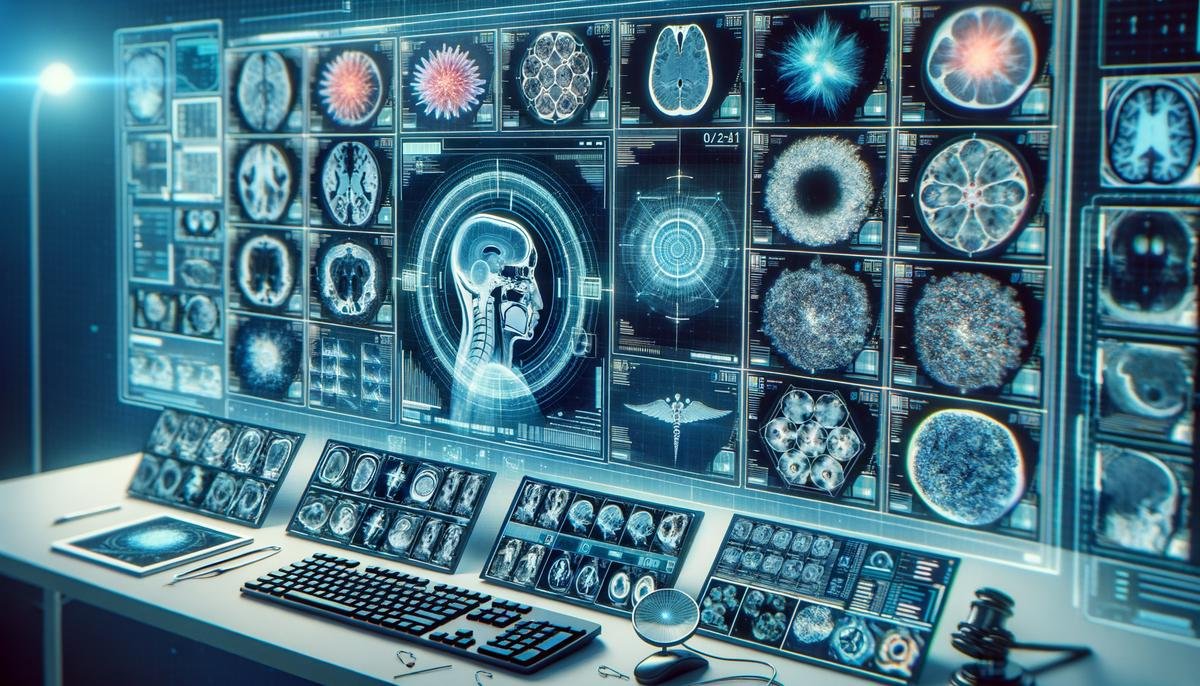AI in Disease Diagnosis
AI and ML are reshaping disease diagnosis through advanced data analysis. These algorithms process large datasets to identify patterns that humans might overlook. For example, ML models can analyze data from electronic health records (EHRs) and imaging studies to enhance diagnostic precision.
In cancer diagnosis, AI-based systems have shown promising results:
- A UK study revealed that an AI system reduced false positives and negatives in breast cancer screenings.
- In South Korea, AI outperformed radiologists in breast cancer detection rates.
AI’s impact extends to various conditions. Algorithms have been used to:
- Detect diabetic retinopathy
- Identify melanoma cases
- Predict cardiovascular risks from ECGs
In chest radiography, an AI application achieved high sensitivity in detecting pneumonia, surpassing radiologist performance.
AI enhances diagnostic accuracy and efficiency while reducing costs. It can analyze medical images faster than humans and improve clinical laboratory testing processes. In emergency departments, AI models help identify severe cases sooner and manage patient flow.
In pharmacogenomics, AI predicts patient reactions to drugs based on genetic data, enabling personalized therapies. AI tools also streamline operations in clinical labs, increasing efficiency and providing faster results.

AI in Personalized Treatment
AI’s role in personalized treatment involves analyzing patient data to create customized treatment plans. This approach, known as precision medicine, aims to maximize efficacy and minimize risks.
Research has shown AI’s potential in predicting responses to various treatments. For example:
- Studies have demonstrated AI’s ability to forecast chemotherapy responses with high accuracy1
- AI models have shown promise in predicting antidepressant treatment outcomes2
These advancements suggest that clinical decision support systems could become valuable tools for healthcare providers.
AI excels at processing vast amounts of patient data, identifying patterns that human analysis might overlook. In oncology, AI assists in categorizing cancers into molecular subtypes, facilitating precise treatment plans. AI’s deep learning capabilities enable more accurate and comprehensive analysis of complex genomic data.
In clinical practice, AI technologies offer benefits in dose optimization. By leveraging advanced algorithms to analyze patient data, healthcare providers can devise more effective and safer treatments, potentially enhancing clinical outcomes and streamlining treatment processes.
AI in Clinical Decision Support
AI-powered clinical decision support systems (CDSS) provide clinicians with real-time insights to enhance decision-making. These systems analyze patient data from various sources to offer recommendations tailored to each patient’s health profile.
Key Applications of AI in Clinical Decision Support:
- Diagnostic accuracy enhancement through cross-referencing patient information against medical datasets
- Streamlining emergency room triage by quickly assessing patient vitals
- Assisting in treatment plan formulation by predicting effective interventions based on similar cases
- Anticipating potential complications through predictive analytics, enabling preemptive measures
For example, AI systems can forecast the likelihood of sepsis in hospitalized patients, allowing for early intervention.
“AI-driven CDSS excel in personalizing patient care by suggesting medication adjustments based on genetic information.”
In surgical settings, AI post-operative prediction models assess individual patient risks and predict recovery trajectories. By automating routine tasks and providing clinical alerts, AI allows clinicians to focus more on patient care.
This integration of AI into clinical decision support systems represents a significant shift in healthcare delivery, potentially improving patient outcomes and operational efficiency.

AI in Genomic Medicine
The convergence of AI and genomics is transforming personalized healthcare. AI algorithms analyze genomic datasets to identify patterns that help predict disease susceptibility and guide treatment decisions.
In oncology, AI algorithms analyze genomic data to categorize cancers into molecular subtypes, enabling the development of customized treatment plans. AI’s deep learning capabilities provide detailed insights into complex genomic data.
Applications of AI in Genomic Medicine:
- Personalized Treatment Strategies: AI systems analyze genetic markers to suggest personalized medication regimens that minimize adverse reactions and optimize therapeutic outcomes.
- Drug Discovery: AI’s integration with genomic data accelerates the identification of new therapeutic targets, potentially delivering new treatments to patients faster.
- Preventive Healthcare: AI’s predictive analytics in genomics play a role in identifying individuals at higher risk for specific diseases, allowing for proactive risk mitigation.
The integration of AI with genomic medicine represents an advancement in personalized healthcare, potentially contributing to more effective and individualized patient care.

AI in Healthcare Operations
AI is revolutionizing healthcare operations by enhancing administrative efficiency and streamlining routine tasks. It automates processes like:
- Scheduling appointments
- Managing patient records
- Processing insurance claims
This automation allows healthcare professionals to focus more on patient care1.
In electronic health records (EHRs), AI systems analyze large volumes of patient information, ensuring accurate data recording and easy accessibility. Natural language processing can interpret and organize clinicians’ free text notes, improving record-keeping accuracy and speeding up information retrieval.
AI optimizes resource allocation within healthcare facilities. Machine learning algorithms can predict patient admission rates, enabling hospitals to allocate staff and resources more effectively. This capability is crucial in managing hospital capacities and ensuring adequate personnel and equipment are available to meet patient demand.
For administrative tasks, AI bots handle repetitive jobs with high precision. Tasks like appointment scheduling, billing, and follow-up reminders can be automated, reducing administrative burdens. AI-driven virtual assistants can interact with patients to schedule visits, send reminders, and answer frequently asked questions.
AI also reduces operational costs by automating routine tasks and identifying inefficiencies in workflow processes. Hospitals and clinics can redirect saved resources towards patient care or other critical areas.
In insurance claim processing, machine learning algorithms can detect inaccuracies or potential fraudulent activity more swiftly than human processors. This ensures claims are processed correctly and promptly, speeding up reimbursement and reducing financial losses associated with fraudulent claims.
AI’s role extends to inventory management, predicting usage patterns of medical supplies to maintain optimal stock levels. This is especially vital during high demand or supply chain disruptions.
In patient management, AI systems enhance the patient experience through personalized care paths and proactive health management. AI can analyze patient data to identify those at higher risk for certain conditions and provide automated follow-up reminders, encouraging treatment plan adherence2.

Ethical Considerations in AI Deployment
Ethical considerations are crucial in AI deployment in healthcare. Data privacy is a pressing issue, as AI systems require massive amounts of sensitive patient information. Healthcare providers must comply with regulations like HIPAA in the United States, implementing strong data encryption protocols and secure storage solutions.
Another concern is potential bias in AI algorithms. AI systems learn from historical data, which may contain biases based on various factors. It’s crucial to continually audit AI models to identify and mitigate any biases, ensuring equitable healthcare outcomes for all patients.
“Transparency and explainability in AI systems are paramount. For AI to be trusted and widely adopted, clinicians and patients need to understand how these systems make decisions.”
Transparent AI models that provide understandable outputs help build trust among users.
Implementing ethical standards and guidelines is essential for responsible AI deployment. Organizations like Intermountain Healthcare have developed frameworks to ensure ethical AI practices, covering aspects such as:
- Evaluating data sets for bias
- Continuous monitoring of AI models
- Ensuring patient privacy and data security
The involvement of multidisciplinary teams is crucial in developing and deploying AI systems. These teams should include:
- Data scientists
- Ethicists
- Clinicians
- Legal experts
Collaborative efforts can help ensure that AI systems are designed and implemented responsibly, addressing complex ethical and legal issues comprehensively3.

AI’s integration into healthcare is transforming patient care by enhancing diagnostic accuracy, personalizing treatments, and streamlining operations. This technological advancement holds the promise of a more efficient and patient-centric healthcare system.



